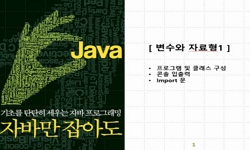본 논문은 jContext라는 자바 기반의 객체지향 상황인지 툴킷에 대해서 소개한다. jContext는 브랜치와 트리거형 상황인지 서비스를 지원하며, 네 가지 특징을 갖고 있다. 첫째는 상황을 클래스...
http://chineseinput.net/에서 pinyin(병음)방식으로 중국어를 변환할 수 있습니다.
변환된 중국어를 복사하여 사용하시면 됩니다.
- 中文 을 입력하시려면 zhongwen을 입력하시고 space를누르시면됩니다.
- 北京 을 입력하시려면 beijing을 입력하시고 space를 누르시면 됩니다.

자바 리플렉션과 메소드 오버로딩을 활용한 상황인지 툴킷 = A Toolkit for Context-aware Systems using Java Reflection and Method Overloading
한글로보기https://www.riss.kr/link?id=A60018668
- 저자
- 발행기관
- 학술지명
- 권호사항
-
발행연도
2012
-
작성언어
Korean
-
주제어
상황인지 ; 툴킷 ; 리플렉션 ; 오버로딩 ; 자바 ; Context-aware ; Toolkit ; Reflection ; Overloading ; Java ; jContext
-
KDC
569
-
등재정보
KCI등재
-
자료형태
학술저널
-
수록면
12-23(12쪽)
-
KCI 피인용횟수
1
- 제공처
- 소장기관
-
0
상세조회 -
0
다운로드
부가정보
국문 초록 (Abstract)
API 지원, 기존 시스템을 상황 인지 시스템으로 재사용 및 확장 등의 유연성 및 확장성을 제공하는 장점이 있다.
본 논문은 jContext라는 자바 기반의 객체지향 상황인지 툴킷에 대해서 소개한다. jContext는 브랜치와 트리거형 상황인지 서비스를 지원하며, 네 가지 특징을 갖고 있다. 첫째는 상황을 클래스로 표현하는 것이고, 둘째는 상황에 따라 달라지는 오퍼레이션을 코드 조각이 아닌 모듈화된 메소드 단위로 기술하고, 동일한 의미의 메소드들을 첫 번째 매개변수를 상황 클래스를 갖는 메소드 오버로딩으로 표현하는 것이다. 셋째, 클래스 외부에서 메소드 호출은 자바 리플렉션을 통해서 상황에 적합한 오버로딩된 다른 메소드를 자동적으로 호출하도록 구성되어 있다. 넷째로 jContext는 계층형 아키텍처와 기능별 모듈화를 통해서 컴포넌트의 교체, 확장 등이 가능하도록 하였다. jContext의 이러한 특징은 새로운 상황 추가, 기존
API 지원, 기존 시스템을 상황 인지 시스템으로 재사용 및 확장 등의 유연성 및 확장성을 제공하는 장점이 있다.
다국어 초록 (Multilingual Abstract)
In this paper, we introduce a Java-based, object-oriented toolkit for context-aware systems named jContext. It supports branch style and trigger style context-aware services, and it has four interesting features. First, it represents contexts as class...
In this paper, we introduce a Java-based, object-oriented toolkit for context-aware systems named jContext. It supports branch style and trigger style context-aware services, and it has four interesting features. First, it represents contexts as classes in the programming language. Second, it represents the different operations executed according to contexts as methods, rather than code fragments, thus allowing the operations to be modular. In addition, methods with the same semantics are represented by method overloading, and have a context class as their first parameter. Third, method calls from outside of class are business logic-oriented and don't have any context class parameters. Internally, these method calls automatically invoke other context-related methods using Java reflection. Fourth, jContext adopts a layered architecture, and its functional units are modular, so that each of them is replaceable and extensible. These features allow jContext to be flexible and extensible, so that it supports new contexts, allows existing APIs to be context-aware, and extends the existing systems into context-aware systems.
목차 (Table of Contents)
- 요약
- Abstract
- 1. 서론
- 2. 관련연구
- 3. 객체지향 관점에서 상황 표현
- 요약
- Abstract
- 1. 서론
- 2. 관련연구
- 3. 객체지향 관점에서 상황 표현
- 4. jContext 구현
- 6. jContext 테스트 및 평가
- 6. 결론
- 참고문헌
참고문헌 (Reference)
1 최종명, "컨텍스트 인지 시스템을 위한 요구사항 도출 및 명세화 방법" 한국정보과학회 35 (35): 394-406, 2008
2 "mProlog: Lightweight PROLOG Engine"
3 "jContext"
4 Anind K. Dey, "Understanding and Using Context" 5 (5): 4-7, 2001
5 Jakob E. Bardram, "The Java Context Awareness Framework (JCAF) - A Service Infrastructure and Programming Framework for Context-Aware Applications" Springer 3468 : 98-115, 2005
6 "RxTx"
7 "PDF-rende"
8 "OpenCV"
9 최종명, "MyGuide: A Mobile Context-Aware Exhibit Guide System" Springer Verlag 5073 LNCS (5073 LNCS): 348-359, 200806
10 Pascal Costanza, "Language Constructs for Context Oriented Programming" 1-10, 2005
1 최종명, "컨텍스트 인지 시스템을 위한 요구사항 도출 및 명세화 방법" 한국정보과학회 35 (35): 394-406, 2008
2 "mProlog: Lightweight PROLOG Engine"
3 "jContext"
4 Anind K. Dey, "Understanding and Using Context" 5 (5): 4-7, 2001
5 Jakob E. Bardram, "The Java Context Awareness Framework (JCAF) - A Service Infrastructure and Programming Framework for Context-Aware Applications" Springer 3468 : 98-115, 2005
6 "RxTx"
7 "PDF-rende"
8 "OpenCV"
9 최종명, "MyGuide: A Mobile Context-Aware Exhibit Guide System" Springer Verlag 5073 LNCS (5073 LNCS): 348-359, 200806
10 Pascal Costanza, "Language Constructs for Context Oriented Programming" 1-10, 2005
11 "JavaCV"
12 Manuel Román, "Gaia: A Middleware Infrastructure to Enable Active Spaces" 1 : 74-83, 2002
13 Gustavo Rossi, "Design Patterns for Context-Aware Adaptation" 170-173, 2005
14 Eric Tanter, "Context-Aware Aspects" 227-249, 2006
15 "BlueCove"
16 Harry Chen, "An Ontology for Context-Aware Pervasive Computing Environments" Cambridge University Press 18 : 197-207, 2003
17 Richard Etter, "A Rule-Based Approach Towards Context- Aware User Notification Services" IEEE 2006
18 Strang T., "A Context Modeling Survey" 2004
19 Anind K. Dey, "A Conceptual Framework and a Toolkit for Supporting the Rapid Prototyping of Context- Aware Applications" 16 (16): 97-166, 2001
동일학술지(권/호) 다른 논문
-
자동화 컨테이너 터미널의 장치장 재정돈을 위한 다목적 협력 공진화 알고리즘
- 한국정보과학회
- 박태진(Taejin Park)
- 2012
- KCI등재
-
900MHz RFID 태그를 이용한 실시간 수량 확인 기법
- 한국정보과학회
- 김구(Goo Kim)
- 2012
- KCI등재
-
감성기반 상호작용 e-러닝 환경에서 프로파일을 활용한 학습 콘텐츠 타입 추천
- 한국정보과학회
- 신민철(Minchul Shin)
- 2012
- KCI등재
-
스마트폰 사용자의 GPS 기반 개인 경로 모델학습 및 이동 경로 예측
- 한국정보과학회
- 김제민(Je-Min Kim)
- 2012
- KCI등재
분석정보
인용정보 인용지수 설명보기
학술지 이력
| 연월일 | 이력구분 | 이력상세 | 등재구분 |
|---|---|---|---|
| 2014-09-01 | 평가 | 학술지 통합(기타) | |
| 2013-04-26 | 학술지명변경 | 한글명 : 정보과학회논문지 : 소프트웨어 및 응용</br>외국어명 : Journal of KIISE : Software and Applications |  |
| 2011-01-01 | 평가 | 등재학술지 유지(등재유지) |  |
| 2009-01-01 | 평가 | 등재학술지 유지(등재유지) |  |
| 2008-10-17 | 학술지명변경 | 한글명 : 정보과학회논문지 : 소프트웨어 및 응용</br>외국어명 : Journal of KISS : Software and Applications |  |
| 2007-01-01 | 평가 | 등재학술지 유지(등재유지) |  |
| 2005-01-01 | 평가 | 등재학술지 유지(등재유지) |  |
| 2002-01-01 | 평가 | 등재학술지 선정(등재후보2차) |  |




 DBpia
DBpia







